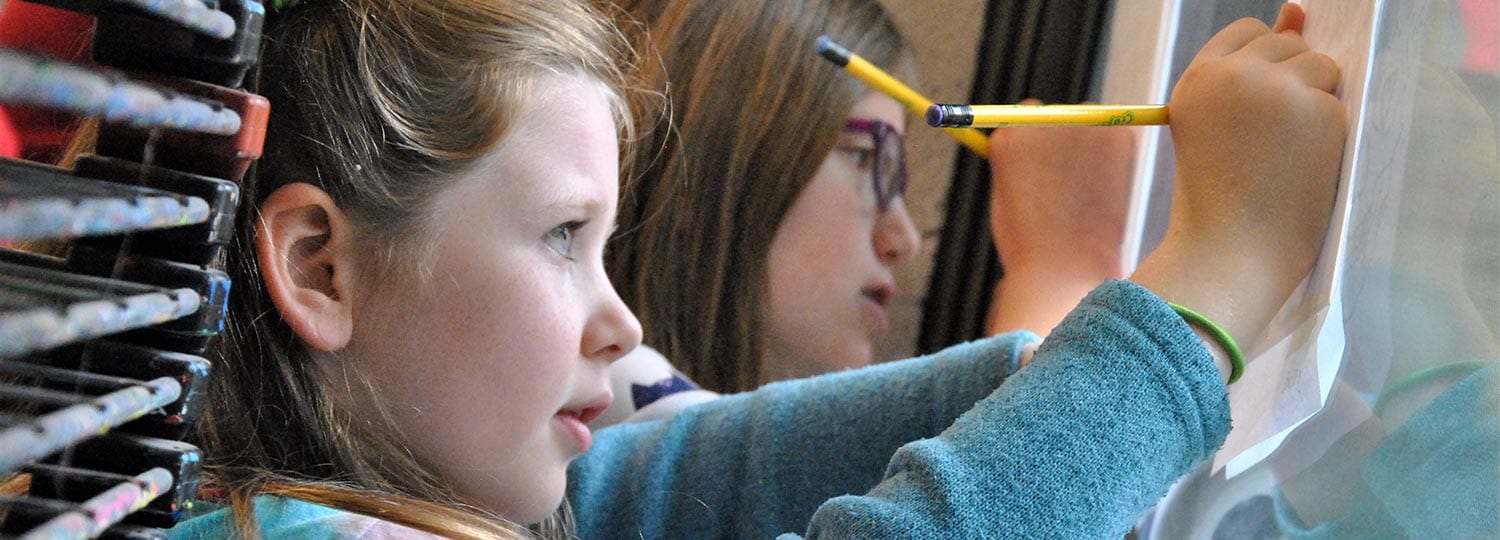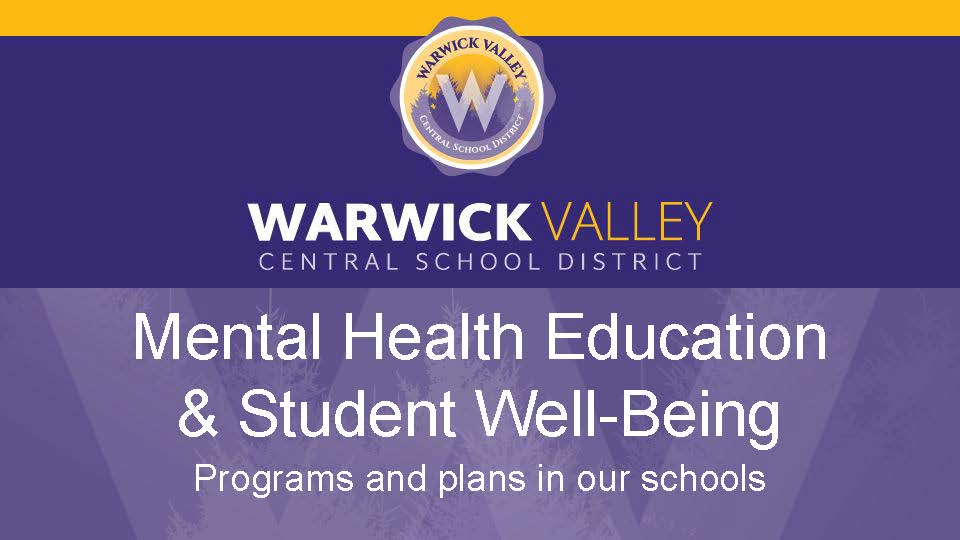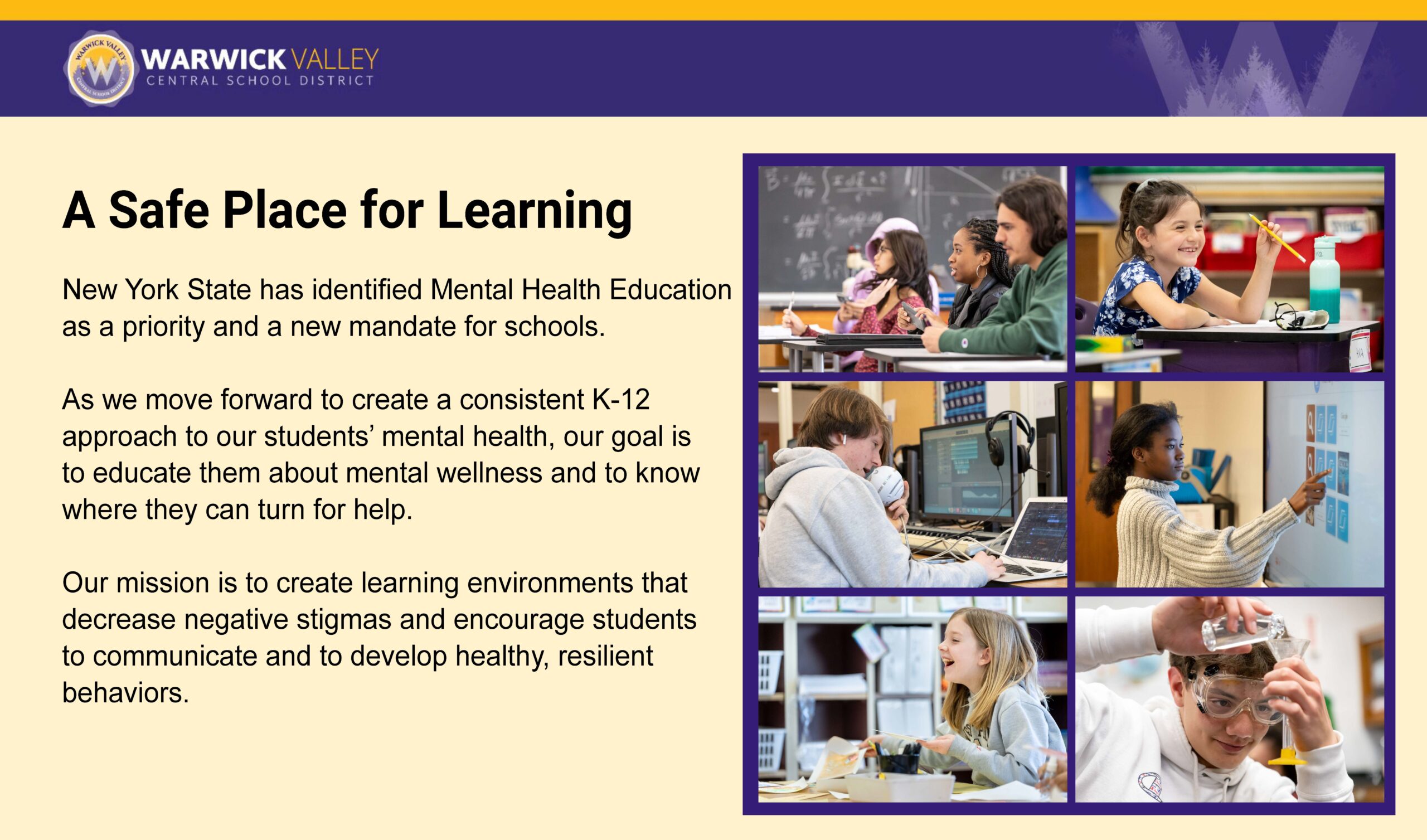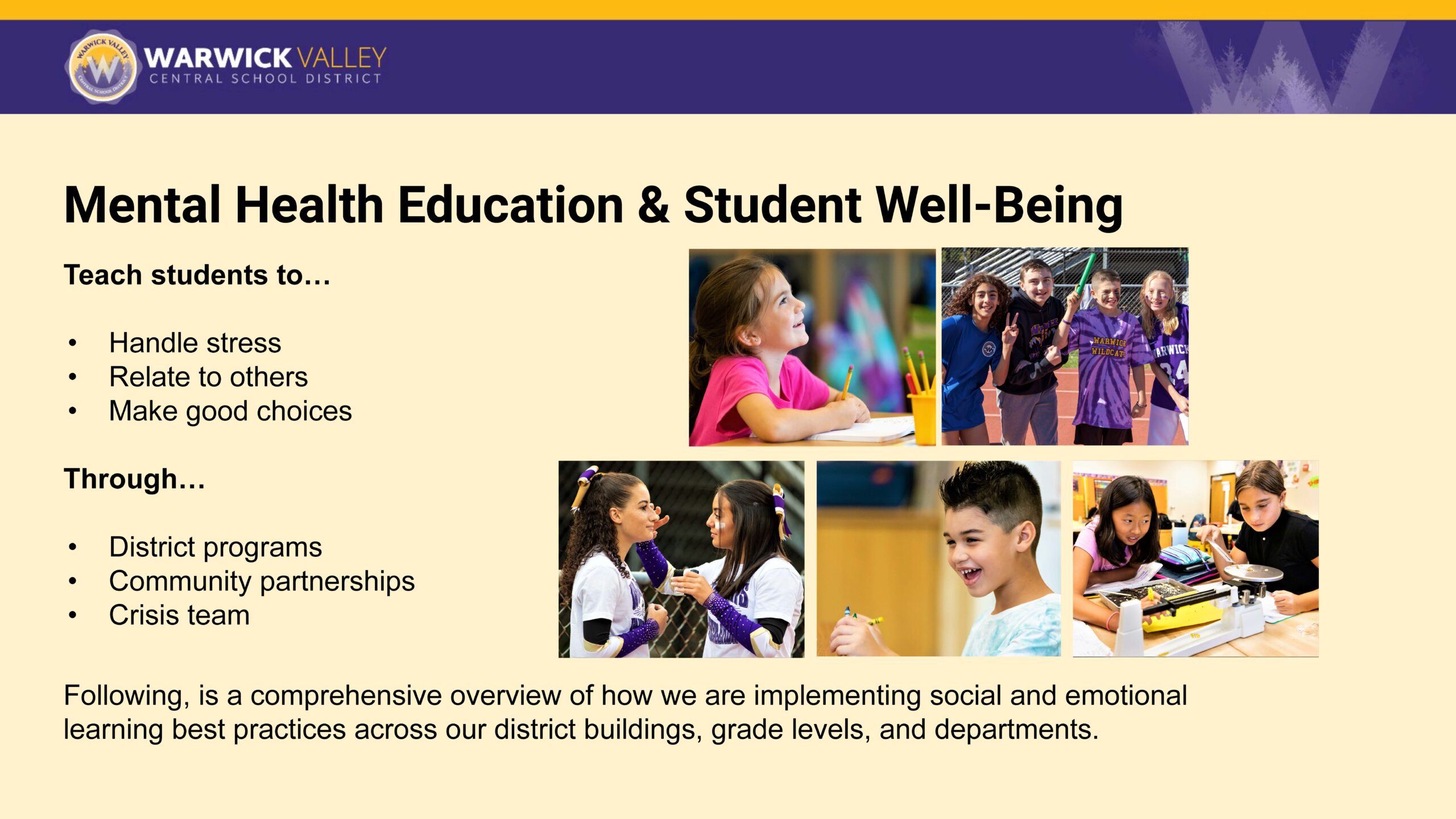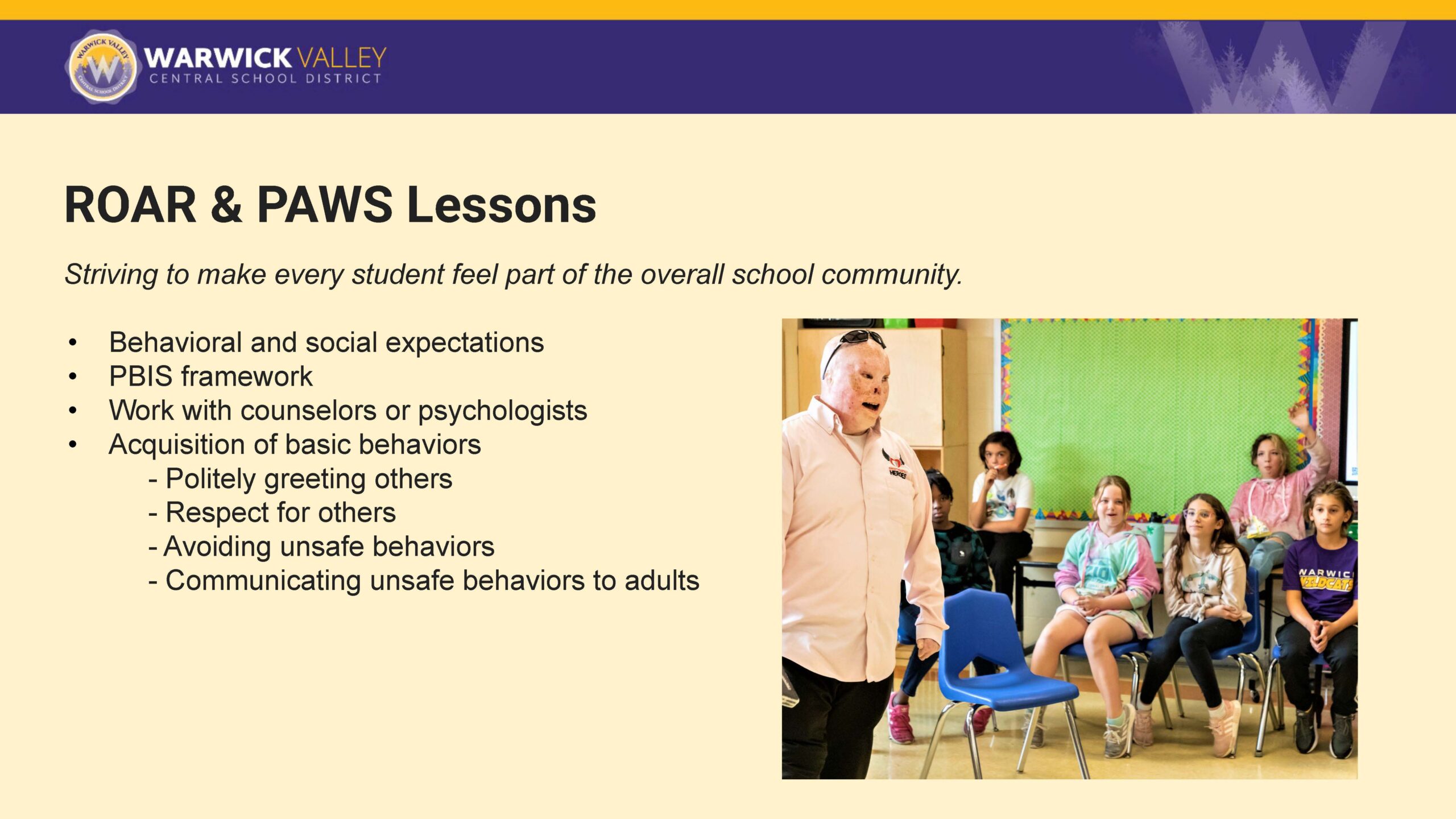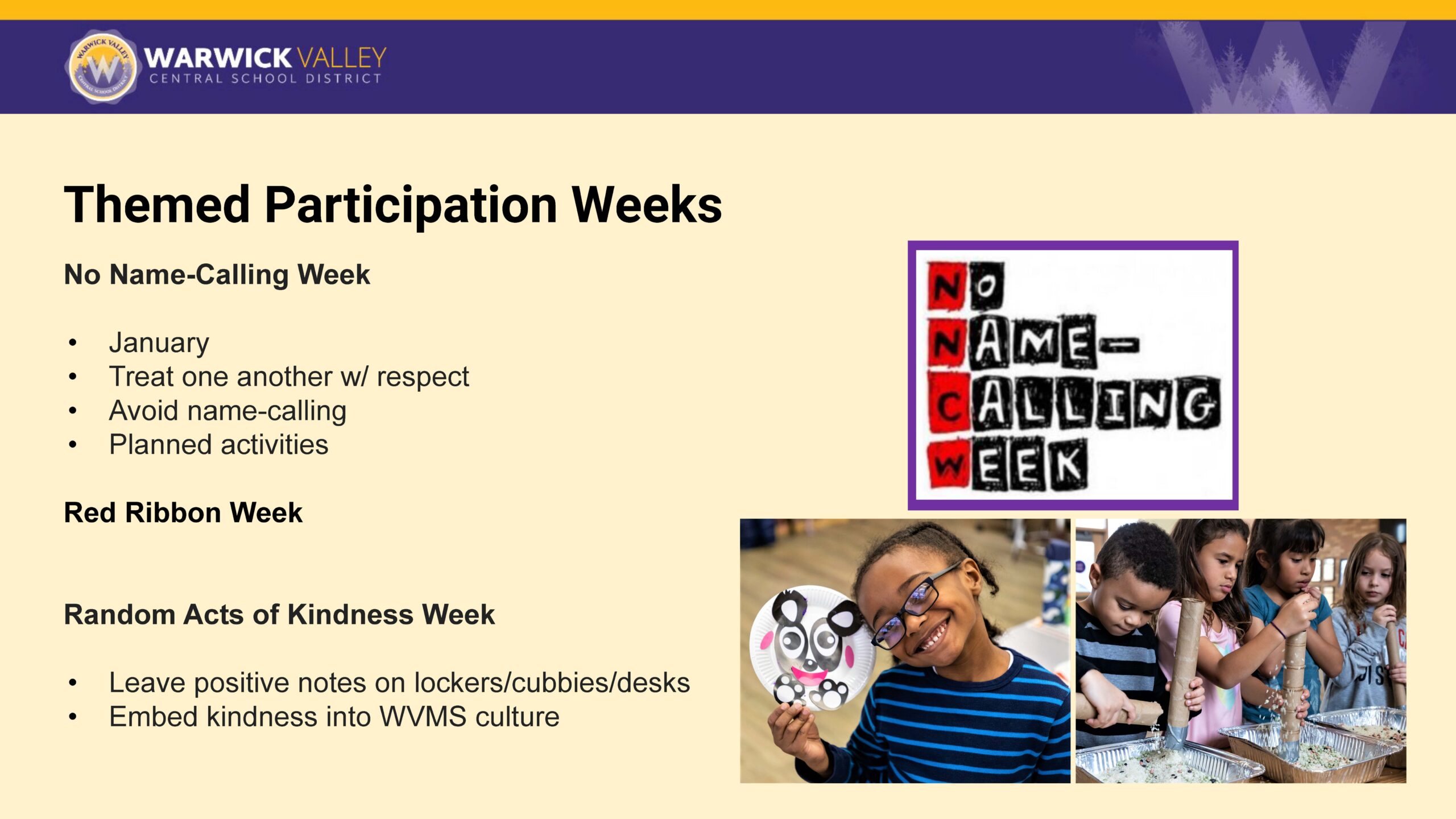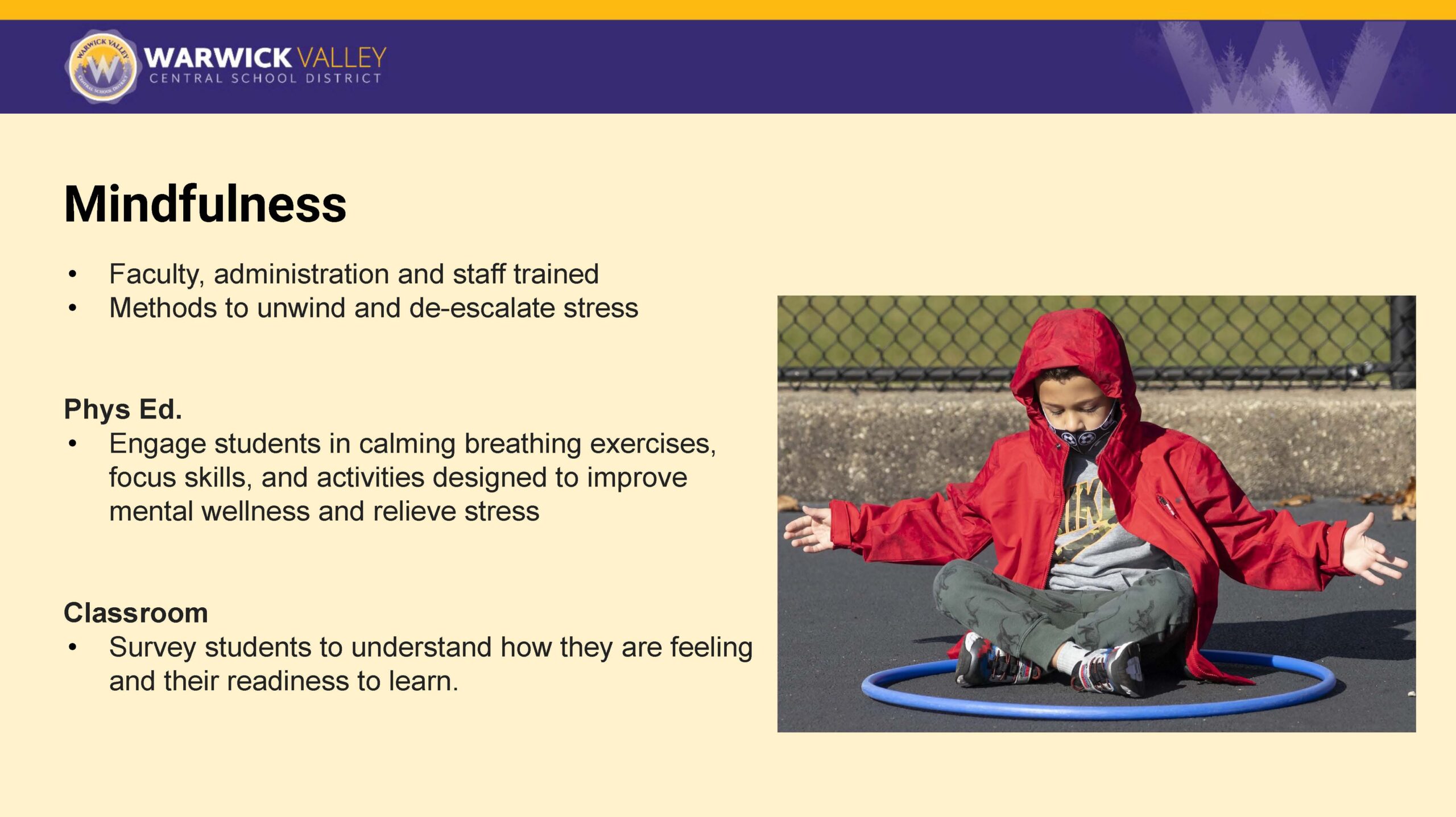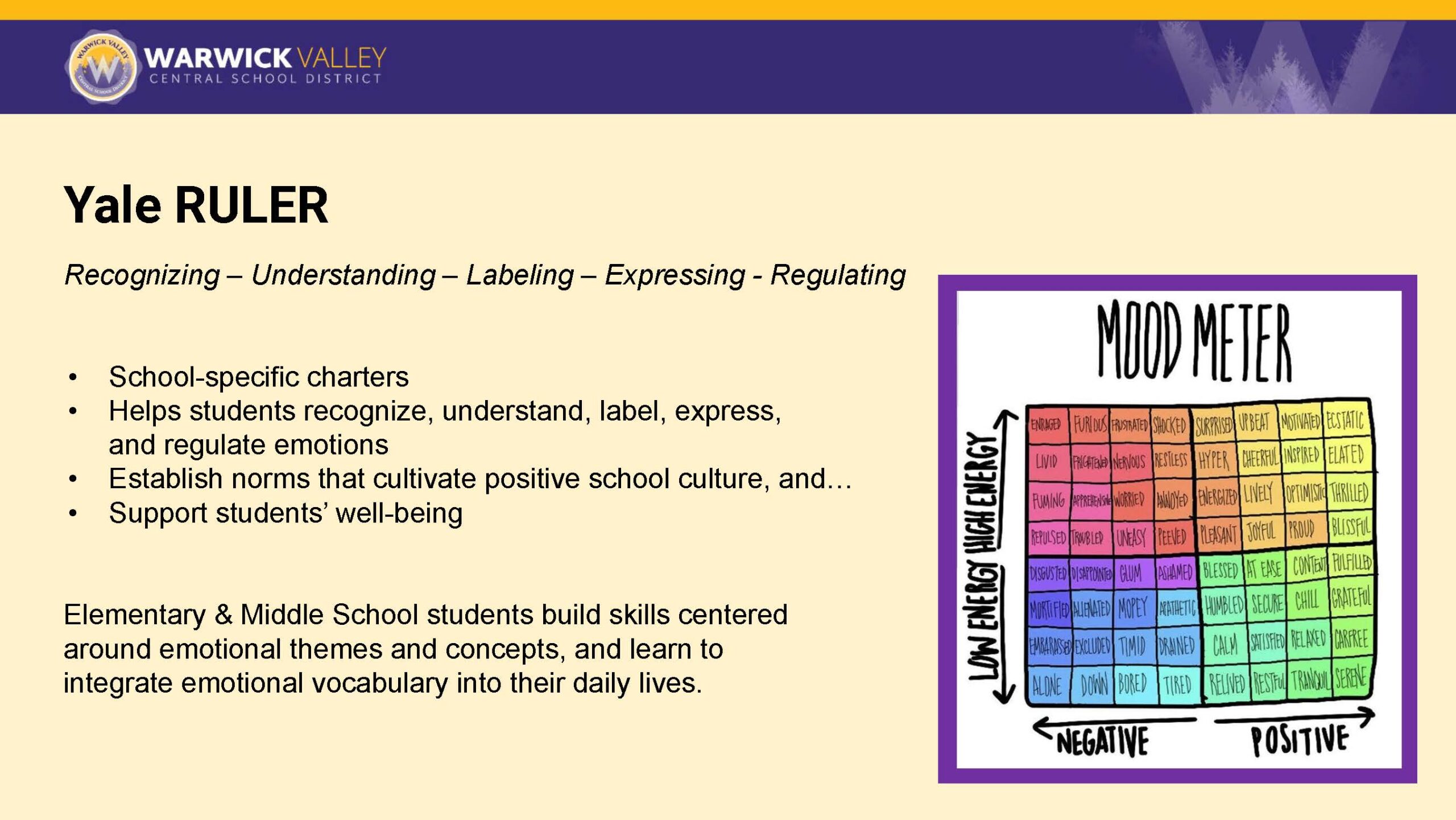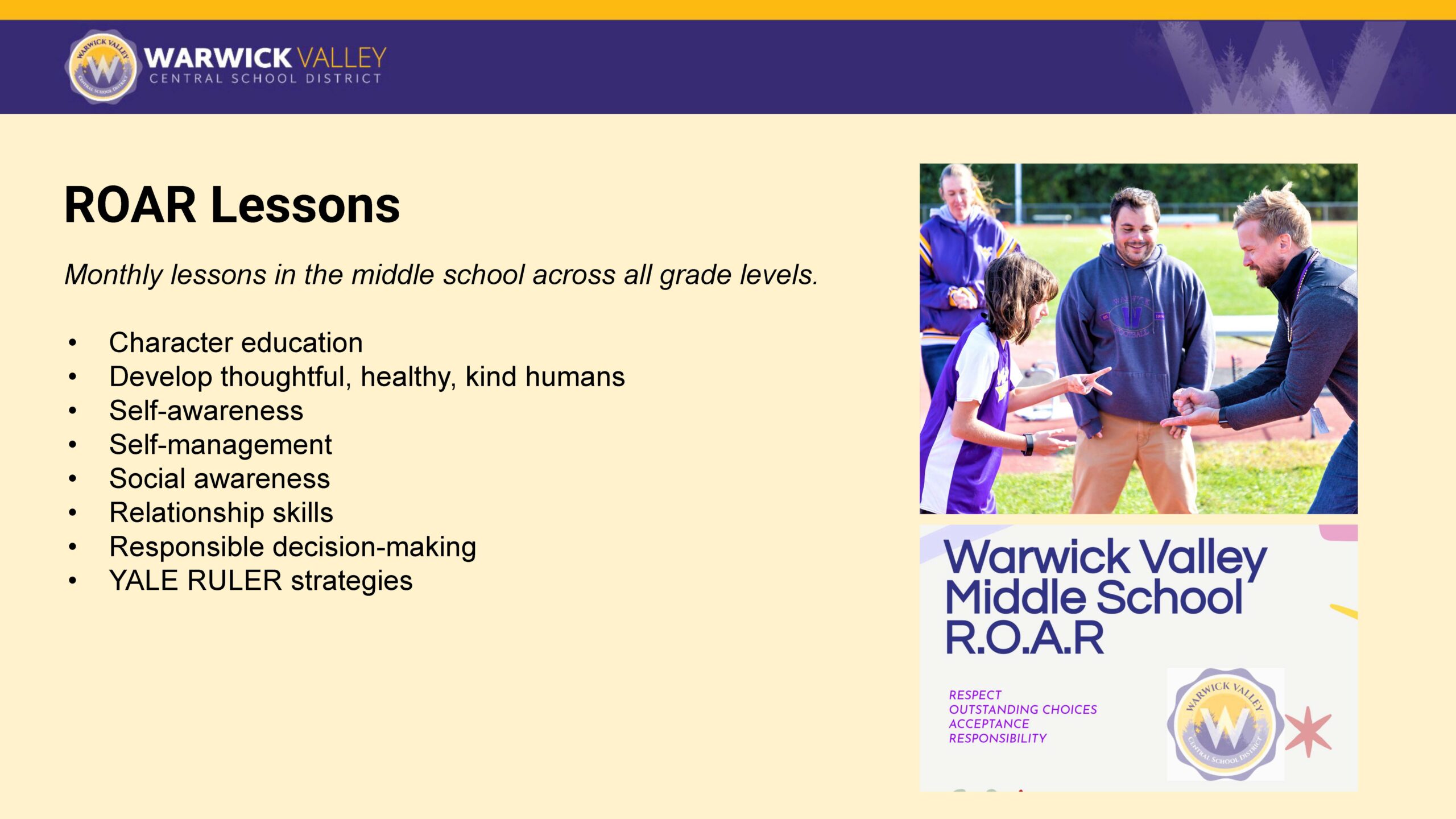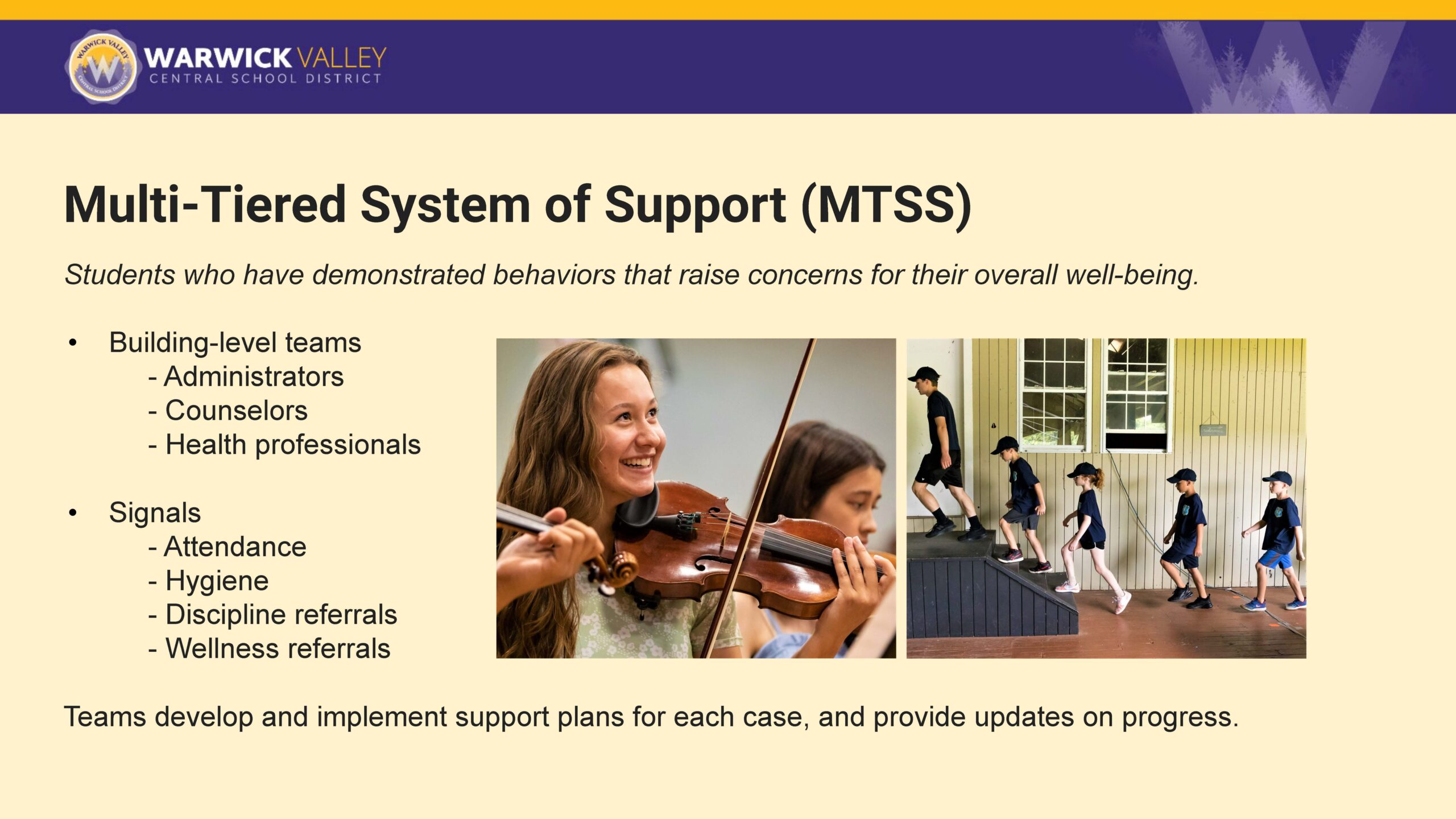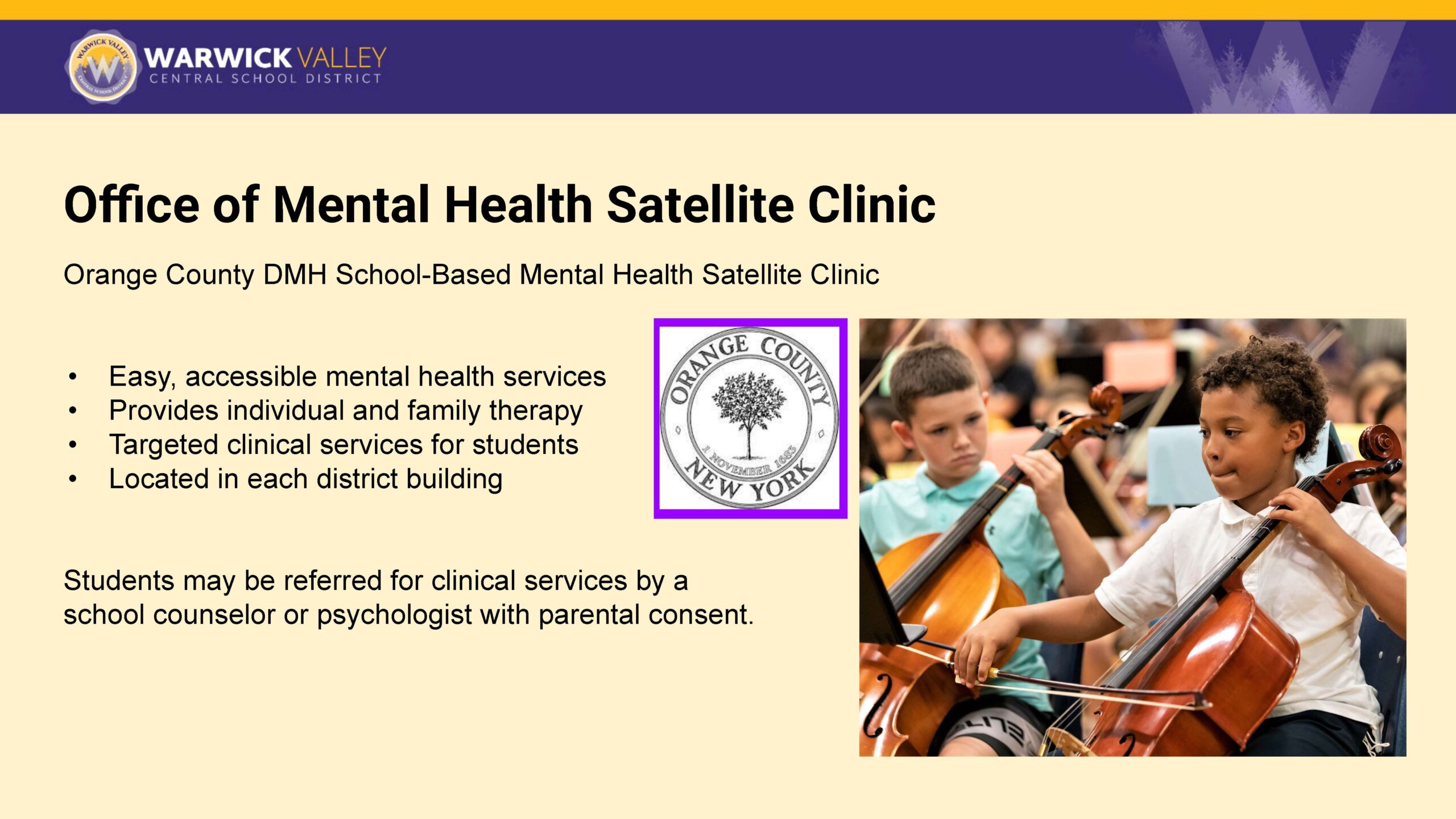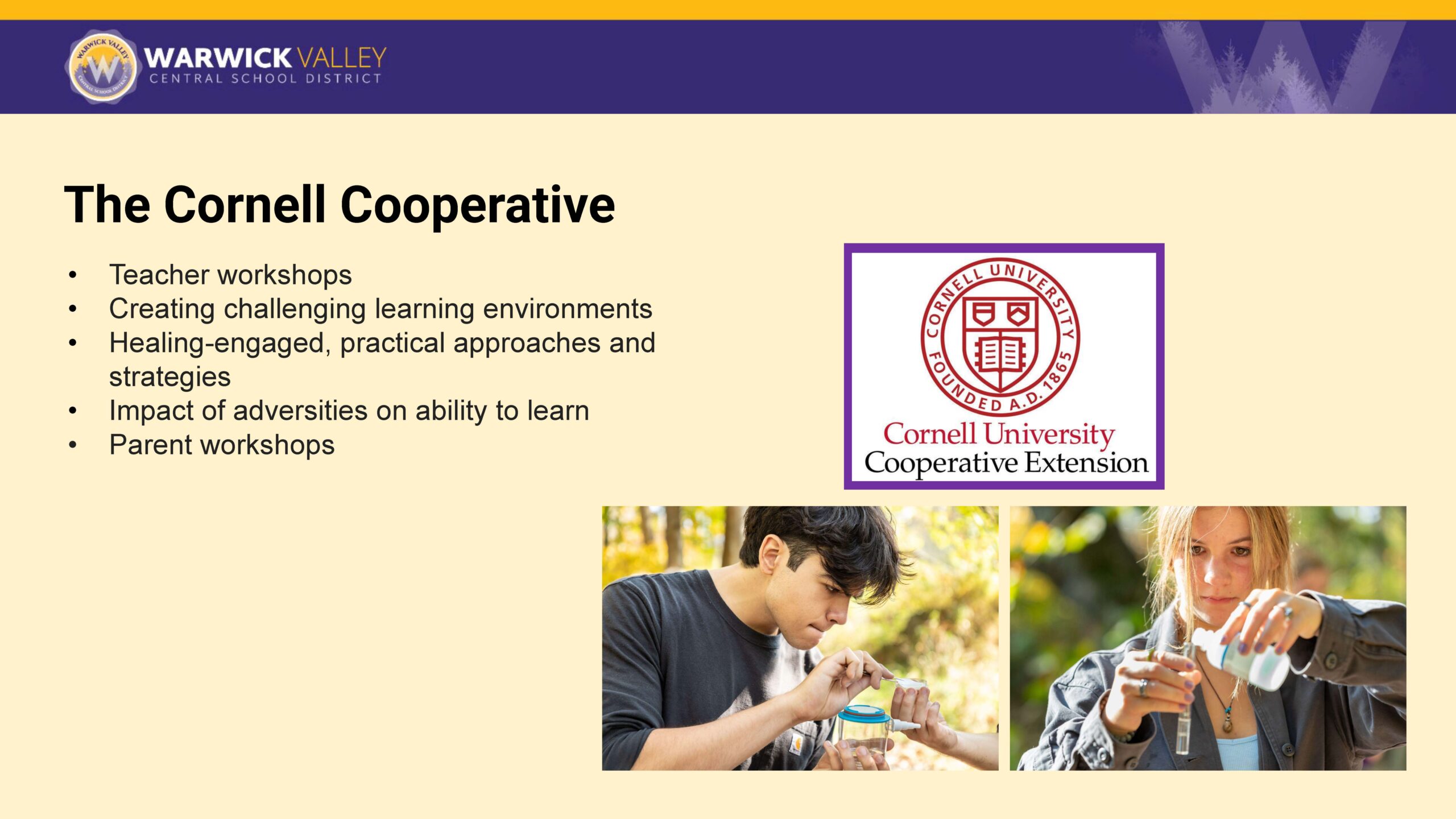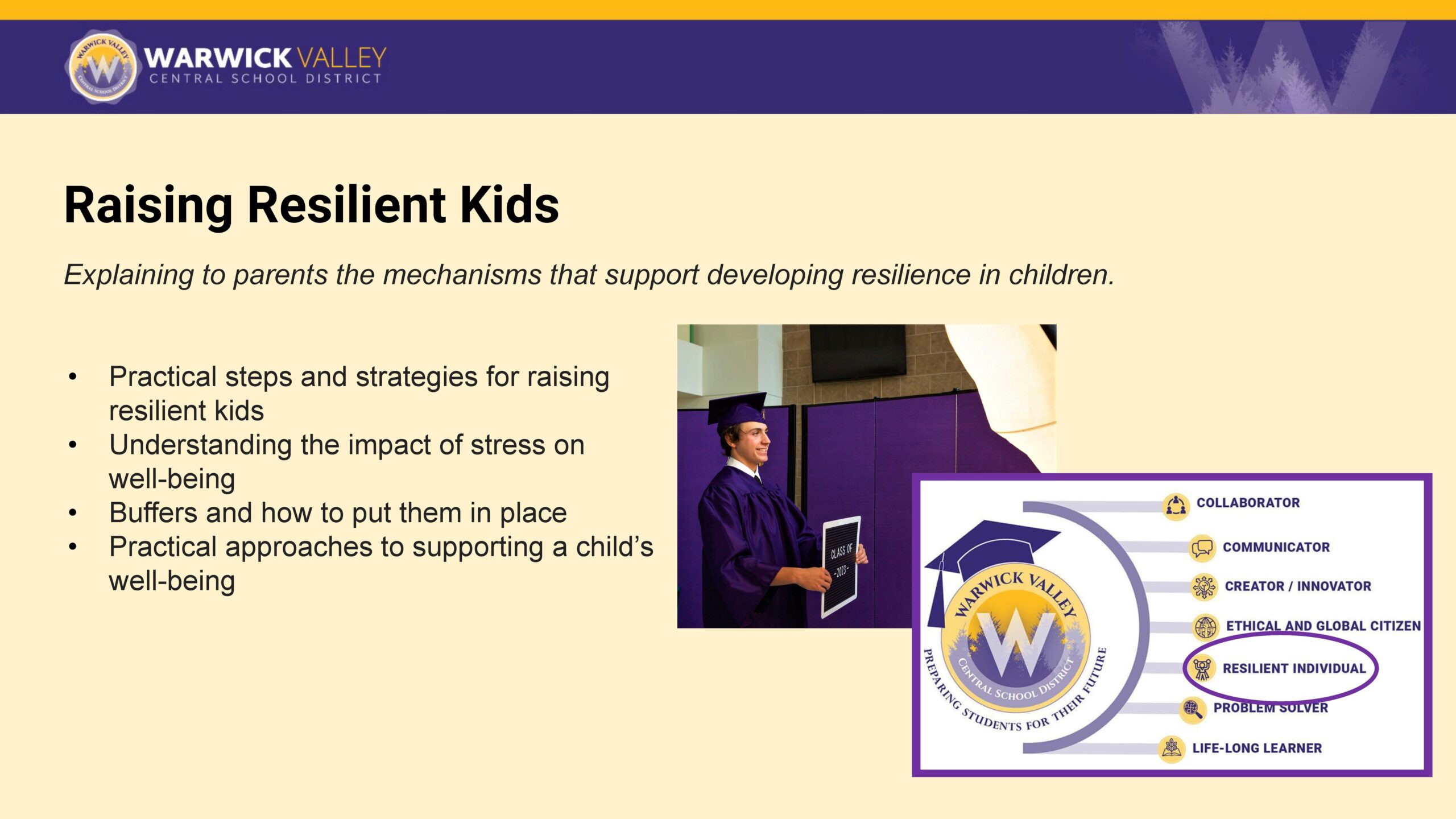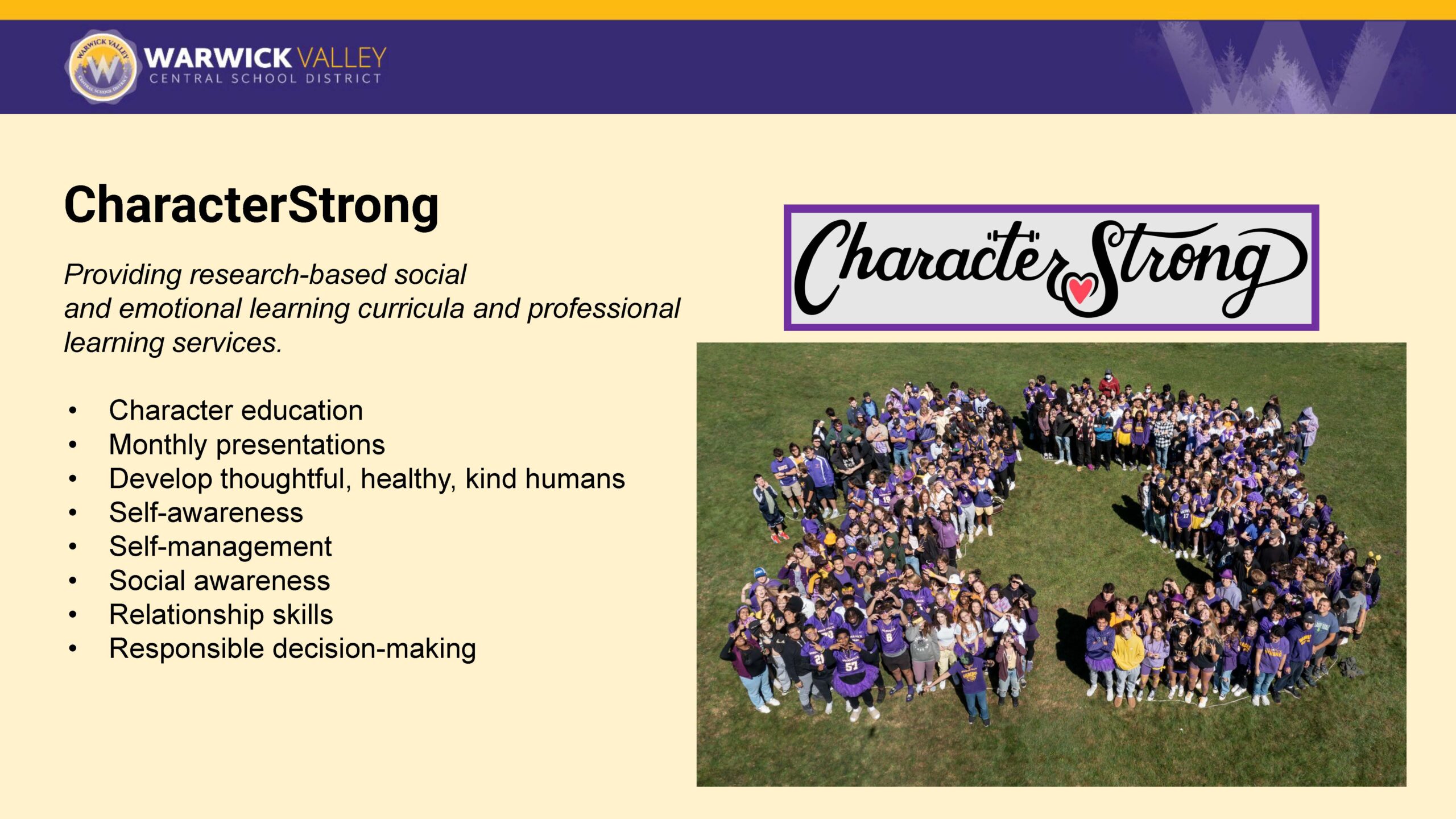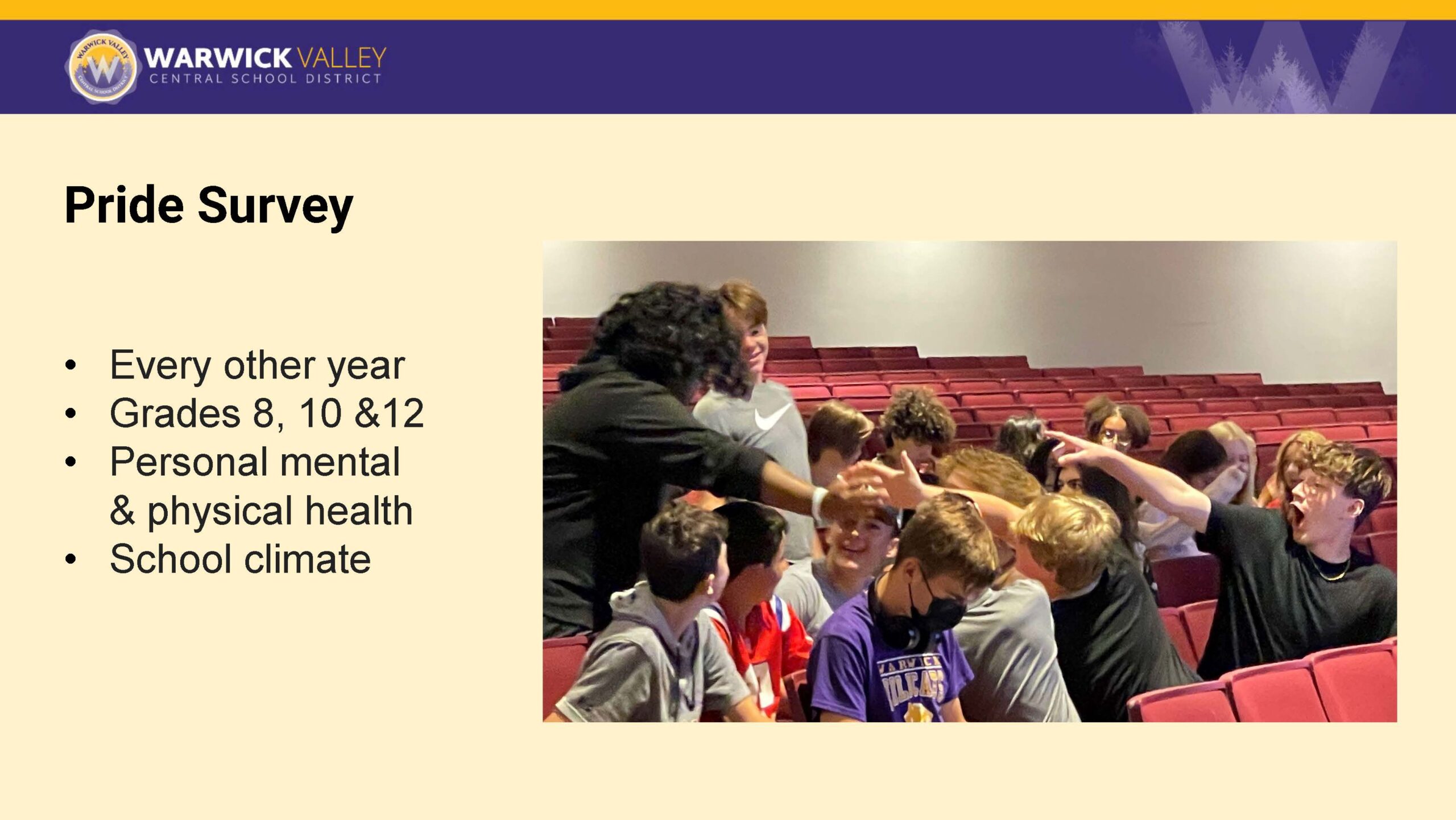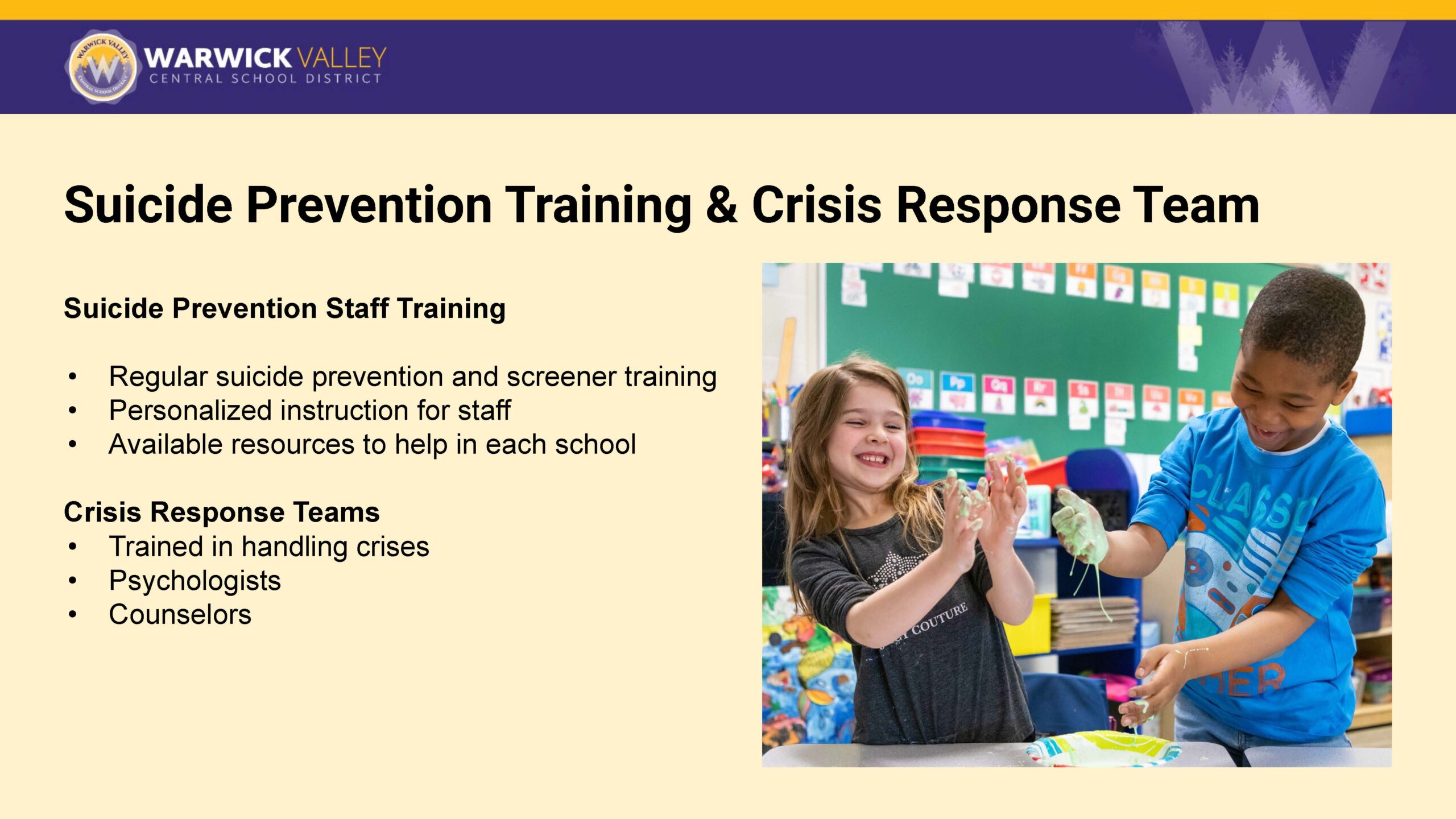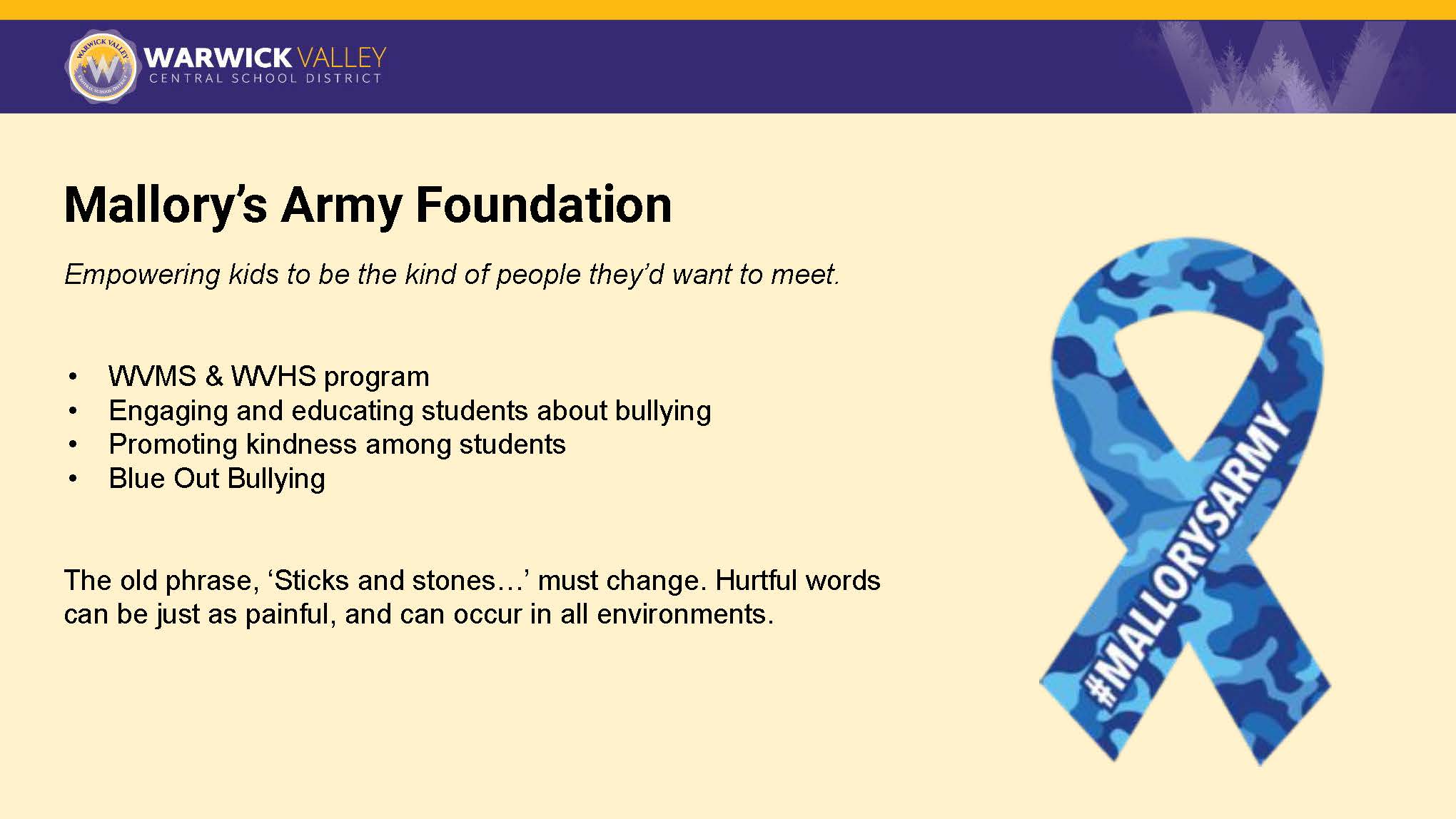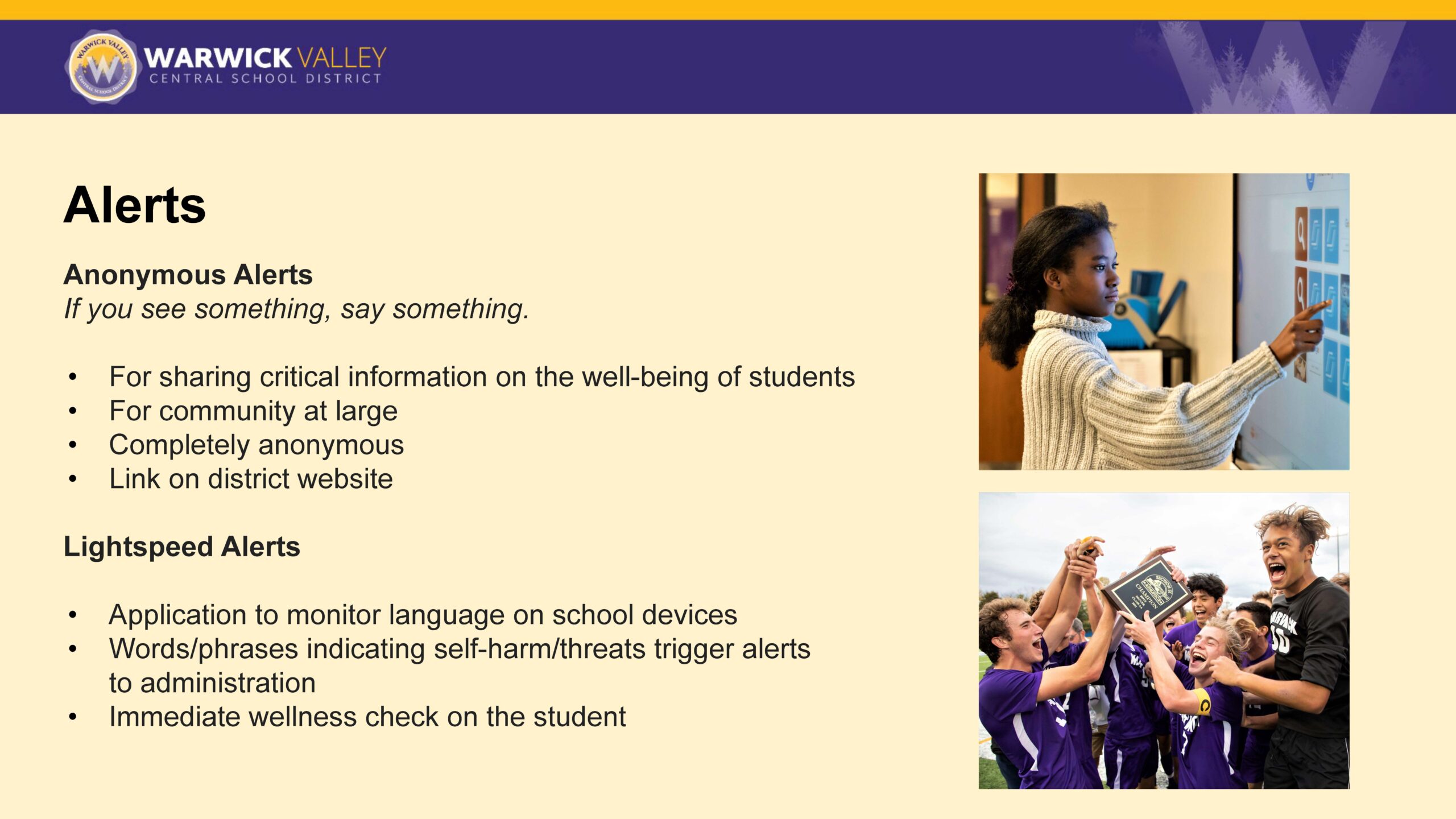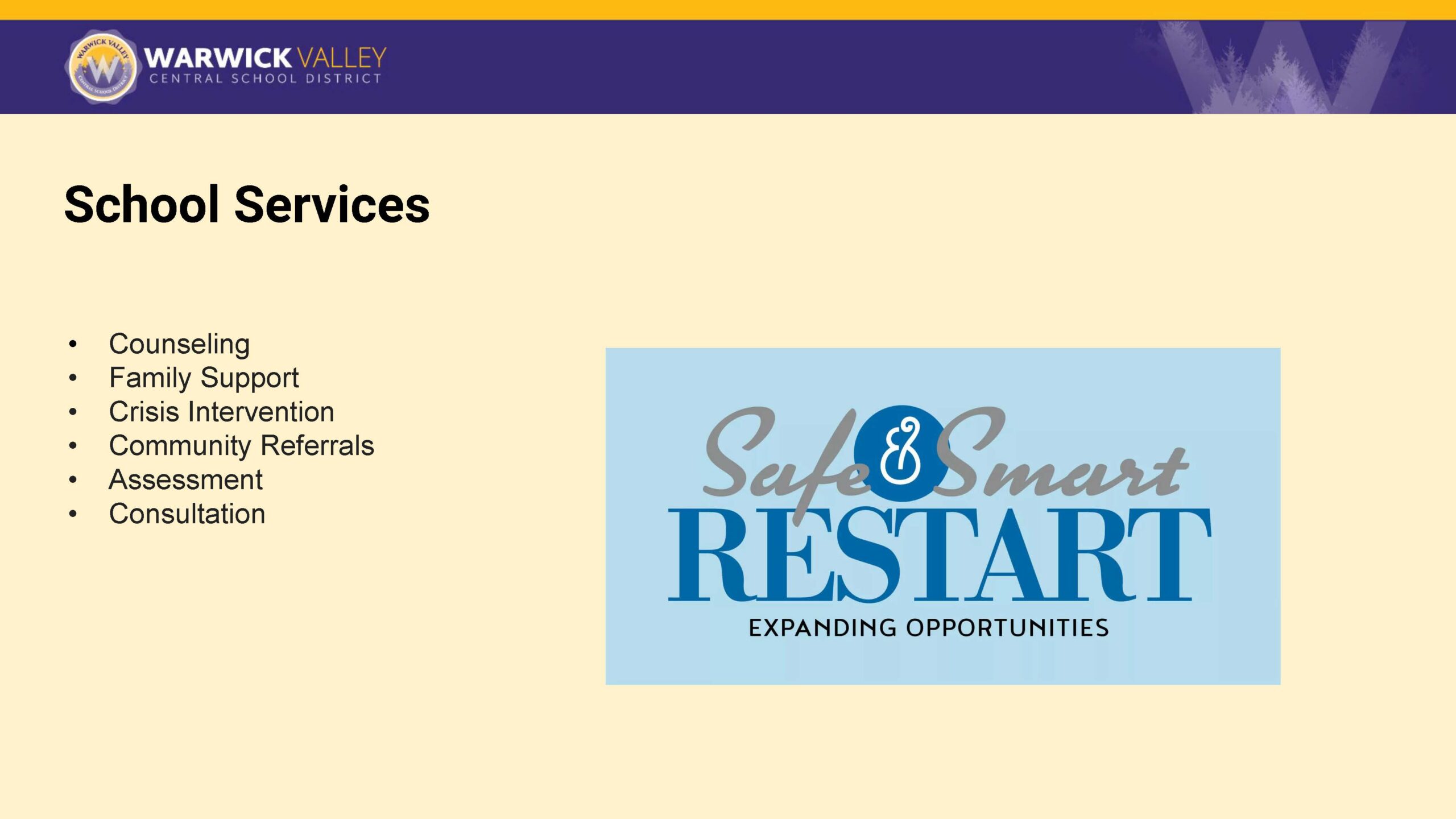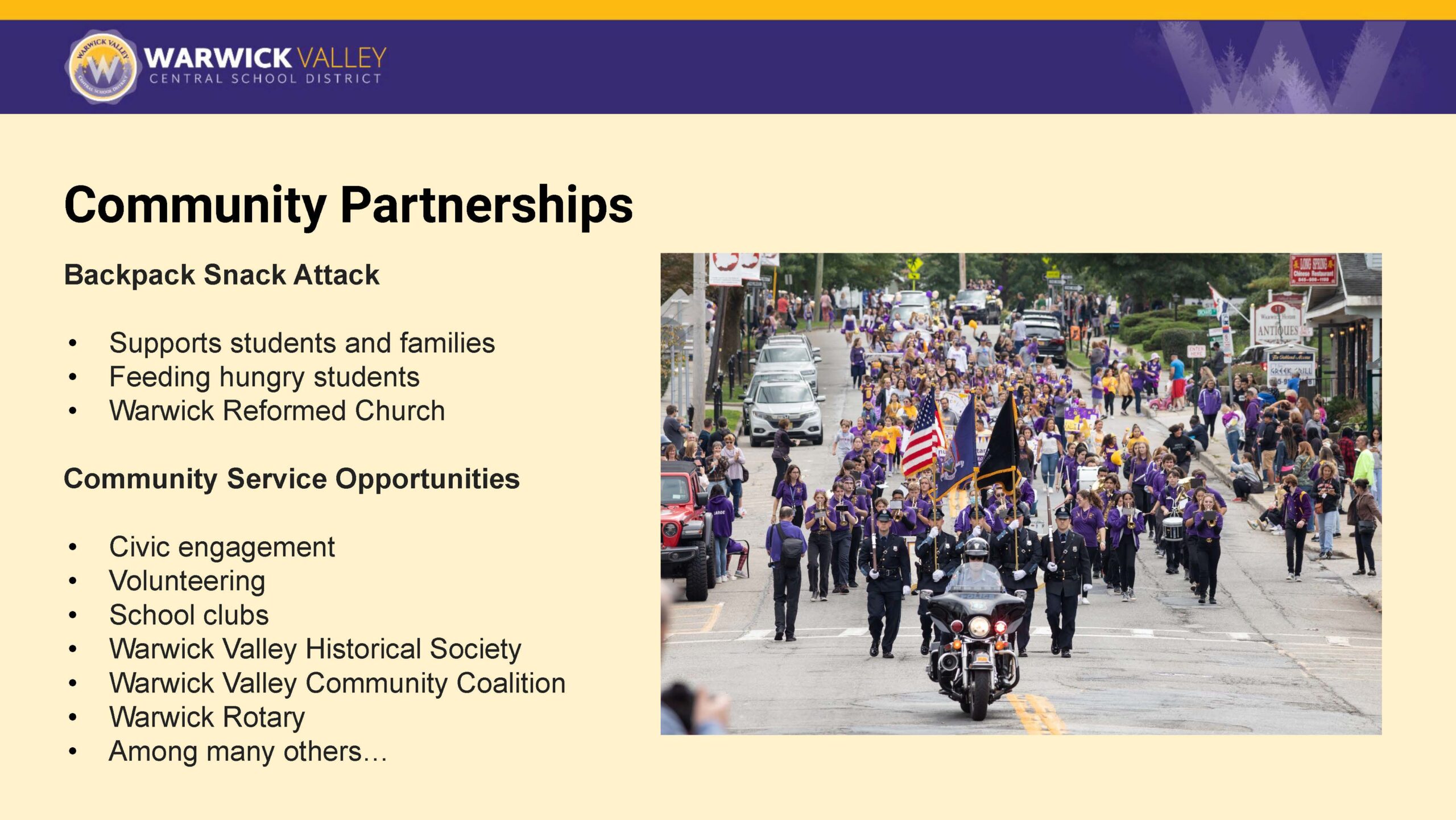District presents comprehensive look at mental health programs and plans
On Thursday evening, October 20, Warwick Valley administrators, faculty, and staff shared with the Board of Education a presentation focused on students’ physical and mental health. The presentation highlighted social and emotional wellness supports and programs in place at all four schools, and gave board and community members in attendance a look at how the district is consistently evolving its K through 12 approach to educating and empowering.
Flip through a slide show of the presentation or view/download a PDF after the presentation below this story.
“It is reported that more than 20% of students ages 13–18 struggle with mental health. Therefore, it is imperative to offer comprehensive, systemic programs,” explained Dr. David Leach, Warwick Valley CSD Superintendent of Schools. “Students who are experiencing mental health issues benefit greatly from having a regular routine of positive interactions and support. Our goal is to help students who are experiencing mental health issues by working closely with them and their families. We also need more opportunities outside of the classroom for our families to pursue. Professionals in the mental health field are in short supply, especially those who work with children and teenagers.”
Assistant Superintendent for Curriculum and Instruction Meghan McGourty led the session.
“Our students’ physical and mental health remains the highest priority for everyone here at Warwick Valley,” said Ms. McGourty. “While New York State has recently identified mental health education as a priority and mandate, our district has long been at the forefront of providing the types of programs and services that support healthy minds, healthy bodies, and promote a safe and engaging learning environment.”
The Warwick Valley approach is to educate the whole child and provide the necessary support, and the mission is to remain on the vanguard when it comes to building the social, emotional, and physical well-being of all our students. Students should always know where and to whom they can turn for help, and the district strives to maintain a learning environment that decreases negative stigmas and encourages students to communicate and to develop healthy, resilient behaviors.
The following is a comprehensive overview of how Warwick Valley schools implement social and emotional learning best practices across all district buildings, grade levels, and departments. Through these district programs and community partnerships, students learn how to handle stress, relate to others, and make positive choices.
R.O.A.R. & PAWS Lessons
During character education sessions, counselors and/or teachers communicate to students the behavioral and social expectations within a school building. The program targets the acquisition of basic behaviors such as politely greeting others and learning how to respect others and specific ways of avoiding unsafe behaviors and communicating unsafe behaviors to an adult. ROAR lessons, specifically, each relate to one of the traits of the district’s Portrait of a Graduate.
“PBIS stands for Positive Behavioral Interventions and Supports, which aim to make every student feel part of the overall school community, and understand that they always have supportive teachers and staff around them,” said counselor Jeanette Myrick. “PBIS serves as the framework for our ROAR and PAWS lessons, which outline building behavioral expectations and help students develop strategies like ways to express both positive and negative emotions.”
Themed Participation/Awareness Weeks
Warwick students participate in themed weeks throughout the year to educate and motivate students around specific issues. In the elementary schools, students talk about celebrating and exercising kindness during No Name-Calling Week in January. Students are encouraged to treat each other with respect and to avoid name-calling. At the middle school, students are encouraged to commit Random Acts of Kindness, leaving positive notes for people on their lockers, cubbies, or desks.
“The random acts go a long way toward setting a positive tone at the middle school,” said WVMS Associate Principal Jared Yapkowitz. “The act of sharing a kind word, a compliment or some encouragement, really embeds kindness into our middle school culture.”
Red Ribbon Week, celebrated in all four schools in October, is an ongoing effort by the Red Ribbon Foundation to help keep kids drug-free.
“Though the overarching message of Red Ribbon Week is around drug use and misuse, at the middle school we focus on how abstention is the best way to maintain a healthy mind and body,” said Mr. Yapkowitz. “Our students put their drug-free pledges on red ribbons that we display all year in the cafeteria. It’s a great reminder for kids to reflect on their choices.”
Flip through a slide show of the presentation or view/download a PDF after the presentation below this story.
Mindfulness
Physical education teachers, mental health providers, and classroom teachers have been trained to help students find safe and simple methods to unwind and de-escalate stress. At the beginning of physical education classes, teachers engage students in calming breathing exercises, focus skills, and activities designed to improve mental wellness and relieve stress. Classroom teachers will often survey students at the beginning of class with simple questions to understand how the students are feeling and their readiness to learn.
“When we talk about learning about and applying mindfulness in our schools, we cover a lot of social and emotional ground,” said Sanfordville Elementary School Principal Johnna Maraia. “Learning about mindfulness means learning about being kind, remaining calm, balanced, and focused, and feeling connected to others. And, feeling ready to learn!”
Yale RULER
The acronym RULER stands for Recognizing, Understanding, Labeling, Expressing, and Regulating emotions. By using a mood meter, students learn to express their emotions, and strategies to get themselves from a negative state of mind into a positive one. Each school has collaboratively authored its own charter, which outlines norms for cultivating a positive school culture that can support students’ well-being. The cumulative approach begins with a new set of expressive words to describe emotions in elementary school, and words are added as students progress through the grades.
“The mood meter and Yale RULER approach is really meant to support all of us,” said Ms. Myrick. “It builds a helpful emotional vocabulary over the years, which anyone can use to effectively communicate their emotions in their daily lives.”
Multi-Tiered System of Support
There is support in place for students who have demonstrated behaviors that raise concerns for their overall well-being. Building-level teams consist of administrators, counselors, and health professionals who meet to discuss students whose behaviors have raised red flags. Attendance, hygiene, discipline referrals, wellness referrals, and changes in grades and participation, among other signs are addressed. This leads to the development and implementation of a support plan for each case, on which teams follow-up and provide progress updates.
“A key strength of our building teams is the many staff members with complementary skills who comprise them,” said Park Avenue Elementary School Principal Bill Biniaris. “It leads to very collaborative and comprehensive approaches and plans that benefit our students.”
Crisis Response Teams include faculty, administration, and school psychologists and counselors trained in handling crises. They are always prepared to intervene and support a student in crisis.
Office of Mental Health Satellite Clinic
Warwick Valley schools are fortunate to have an Orange County Department of Mental Health School-Based Mental Health Satellite Clinic on location. The clinic provides easy and accessible options for students who may have difficulty finding mental health services. With parental consent, a school counselor or psychologist may refer students for clinical services. An OCDMH social worker will provide targeted clinical services to students with more intensive needs.
The convenient location of a satellite office in the school district provides access for students and parents who may have difficulties with transportation and other obstacles to accessing care. Most insurance is accepted, and there is a sliding scale fee for services available for individual and family therapy.
Flip through a slide show of the presentation or view/download a PDF after the presentation below this story.
The Cornell Cooperative
The Cornell Cooperative workshop for teachers helps educators learn how to develop and strengthen students by creating a challenging learning environment that uses healing-engaged approaches and strategies. Cornell also offers virtual parent workshops designed to help families work on parenting styles, understand their child’s behaviors, and learn about childhood development in general.
“We have seen a huge uptick in parental involvement with the online option, which is great,” said Ms. Myrick. “We had 46 families register for a recent session, which is a much higher number than ever before.”
Director of Special Education, Alexandra D’Angelo, said, “Among many important topics, these workshops focus on just how important self-care is for adults and students alike.”
The workshops deepen an understanding of the impact adversities have on the nervous system and our ability to learn, increase knowledge of the concept of resilience, and teach practical strategies and approaches for the classroom that foster well-being and a sense of belonging.
Raising Resilient Kids
This workshop explains the mechanisms that support the development of resilience in children and provides participants with practical steps and strategies for raising resilient kids. Being a “resilient individual” is one of the seven traits outlined in the district’s Portrait of a Graduate. Parents gain an understanding of the impact of stress on their child’s well-being, look at the role of buffers and how to put them in place, and expand their knowledge of practical approaches to supporting their children’s well-being.
CharacterStrong
This character education program at the high school helps students develop into thoughtful, healthy, kind human beings. School counselors present lessons addressing self-awareness, self-management, social awareness, relationship skills, and responsible decision-making to grade-level study halls at least once a month.
“This program isn’t seen as one more thing on a high schooler’s plate. It is the plate,” said WVHS Principal Marguerite Fusco. “We know valuable connections are being made, because we always have alumni coming back to visit and share how important their relationships with teachers and administrators were in guiding their choices after graduation.”
Pride Survey
Administered every other year to students in grades eight, 10, and 12, the Pride Survey allows them to anonymously share honest responses to questions that focus on personal mental and physical health and school climate. Comprehensive results of the survey responses help district administration understand and make informed decisions regarding student behaviors and perceptions on topics that affect student achievement and well-being.
Suicide Awareness & Prevention
The district provides staff with suicide prevention and screener training regularly. The training provides personalized instruction for staff at each building so that faculty are aware of available resources, including colleagues on hand to help in each school. The middle and high schools are also working with Mallory’s Army Foundation to engage and educate students about bullying, and to rethink the old phrase, ‘Sticks and stones may break my bones…” The goal is to express to the community that hurtful words can be just as painful in all environments – at school, through technological means, and on social media.
“This year, we are inviting parents and students to attend a viewing of Mallory, the film that shares Mallory’s story of bullying and suicide with the world,” said WVMS Principal Georgianna Diopoulos. “By providing this opportunity, we hope to facilitate a meaningful dialogue between children and parents about this topic that can be so difficult to discuss.
Alerts
“We all know the phrase ‘if you see something, say something,’” said WVHS Associate Principal Erin Hill-Lewis. “So, we have the means for anyone – students, parents, community members – to provide the district critical information regarding the well-being of students on an anonymous basis.”
Anonymous Alerts can be issued via a link on the district website to report any behaviors that could compromise the personal safety of a child in the school district. The district also employs technology called Lightspeed alerts, which examines language usage on district devices, and keys in on words and phrases that indicate the possibility of self-harm or threatening behavior. These instances trigger alerts to an administrator for immediate check-ins on the student’s well-being.
Flip through a slide show of the presentation or view/download a PDF after the presentation below this story.
School Services
The district offers support and access to many types of services, including counseling, family support, crisis intervention, community referrals, assessment, and consultation.
“We are fortunate to be able to offer individual counseling based on students being in crisis,” said Ms. Myrick. “We also work with families on a constant basis. This is a very transitional program for students as they progress from their elementary school years through graduation.”
Community Partnerships
As part of the district’s holistic approach to supporting students’ and families’ mental health, it collaborates with community groups, including the Warwick Reformed Church, on the Backpack Snack Attack program, feeding hungry students in the Town of Warwick. Students have numerous community service opportunities to get civically engaged through volunteering and school clubs like the Interact Club and its relationship with Warwick Rotary. Affiliations with blood centers, the Warwick Valley Historical Society, and the Warwick Valley Community Coalition, among others, allow students to participate in local charitable events that build a sense of community and self-worth while helping others.
Mental health is a more critical issue now than ever, and the district is committed to helping Warwick students cultivate healthy minds and bodies in every way possible. Parents and guardians are encouraged to converse about these complex topics with their children, reinforcing the importance of mental health at home. The district is off to a fantastic 2022–2023 school year and is looking forward to continuing the work that helps keep Warwick children healthy, safe, and ready to learn.
Mental Health Education & Student Well-Being
Programs and plans in our schools
View/download the WVCSD Mental Health Programs presentation as a PDF here.

